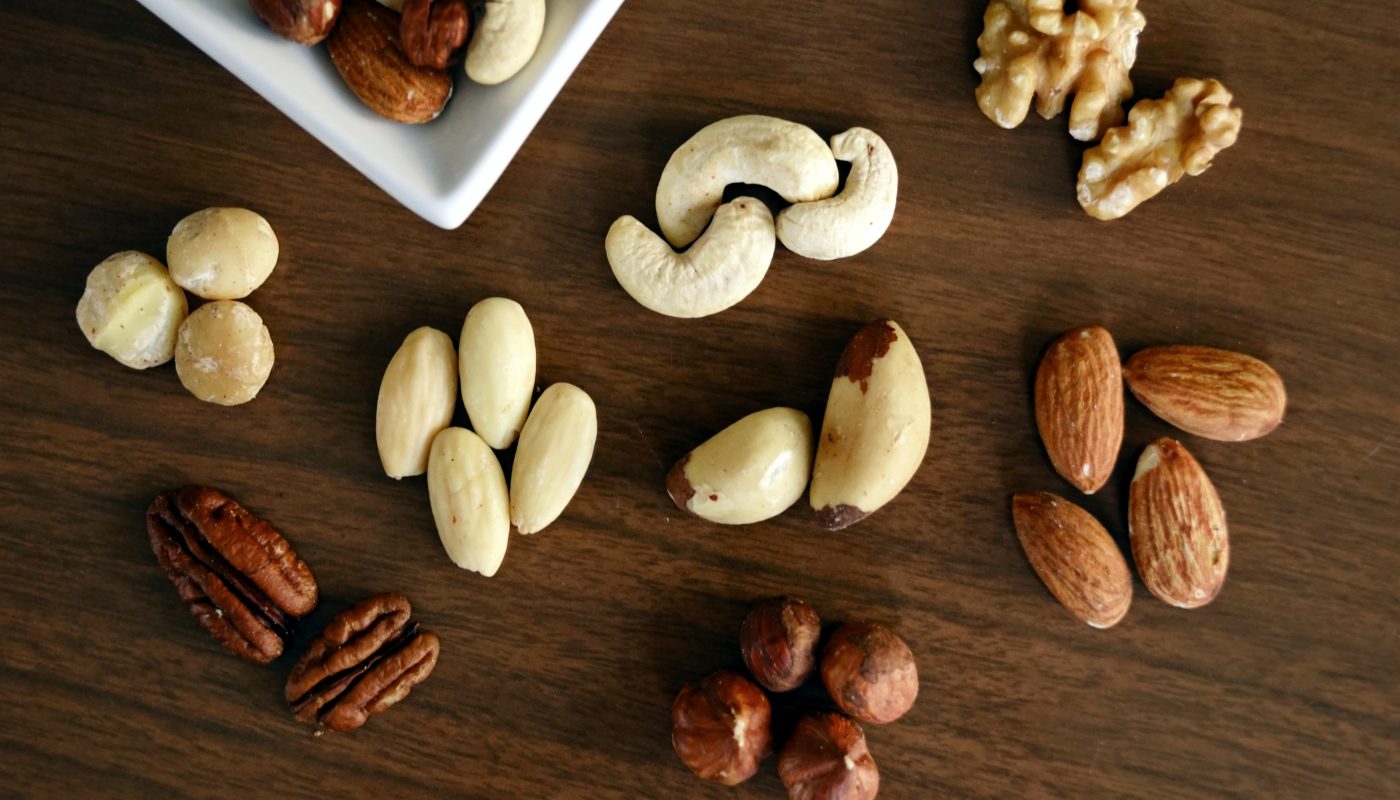Nuts refer to dry fruits that are mainly single-seeded. Although nuts generally have a high oil content, they are also highly rich in fibre, healthy fat, vitamins, and plant protein. In addition, nuts have a hard, leathery, textured protective shell around them. Nuts are defined as hazelnuts, pecans, and chestnuts. However, as per botanical definition, peanuts and almonds are not nuts. Peanuts and almonds both belong to the “legumes” family.
Since ancient times, nuts have been the most crucial element of the human diet that enriches the internal system with healthy nutrients. There were seven varieties of nuts discovered at that time. These nuts were wild almonds, prickly water lily, water chestnuts, two types of pistachios and acorns. In addition, people used stone tools to crack the nuts.
There are many religious references where the holy bible mentions nuts. For example, Joseph’s brothers brought pistachios and almonds to trade grain on their second journey to Egypt.
Nuts are rich in healthy nutrients that are super beneficial for the human body, such as vitamins, minerals, protein, iron, omega-3 fatty acids, manganese and riboflavin. In addition, they are rich in folate, antioxidants like resveratrol, carotenes, lutein, and cryptoxanthin, etc. These powerful nutrients help control blood pressure, heart rate, and the production of red blood cells. Furthermore, they also help prevent cardiac and inflammatory diseases. Moreover, it provides nourishment to the brain and skin.
Nuts and Weight Loss
Talking about weight loss may excite some people facing serious bodyweight issues, but the first and foremost thing is that it will take time and consistency. You should be consistent in limiting your calories, improving your metabolism and following a diet that gives you all the essential nutrients. All these will improve your body’s functioning to support healthy weight management. It is not a theory, but a wealth of knowledge.
A high metabolic rate helps in weight loss. It is because metabolism requires calories to perform all the body functions, and in order to burn more calories, a person must have a strong metabolism. That leads to weight loss.
Nuts are super nutritious and provide many health benefits. Still, one of the most beneficial qualities of nuts is that they are highly rich in fibre. As a result, they help control calorie intake, manage weight, and lower sugar absorption in the blood.
If you consume fibre, it will aid in improving your gut health. It is because fibre gets slowly digested. In addition, it adds bulk to the stool that helps healthy and maintained bowel movements. Although our bodies digest fibre slowly, the bacteria present in the gut ferment the fibre and turn it into short-chain fatty acids [SCFA’s].
Slow fibre digestion means slow sugar release in the blood. As a result, it increases energy levels in the body. It also helps in reducing the chances of obesity and diabetes.
It helps you feel full, reducing extra calorie intake through other foods. Almonds and walnuts offer 3.3 and 1.9 grams of fibre per ounce, making them a better nut option.
A study assessing the result of the Mediterranean diet demonstrates that people who eat nuts can lose an average of 2 inches of fat from their waist.
Nuts for Weight Loss
1. Walnuts
Even though walnuts are 65% of fat, they don’t aid in obesity risk as it decreases the intake of other foods in your diet. That is because walnuts contain an adequate amount of fibre that keeps the belly full for long. As a result, it keeps you satiated and reduces the urge of eating between meals, leading to a lower calorie intake.
Walnuts contain protein and polyunsaturated fats. Polyunsaturated fat contains omega3 and omega6 fatty acids, a healthy dietary fat. In addition, walnuts contain Alpha-Linoleic acid, which helps burn fat faster and promotes heart health. According to researchers, walnuts stimulate the region in the brain that controls food cravings and regulates appetite – the right insula.
A study suggests that foods rich in polyunsaturated fats lowers the hormone ghrelin. Ghrelin provides hunger sensing signals to the brain. In addition, the copper content in walnuts helps strengthen the immune system, develop blood vessels and produce high energy in the body.
Walnuts are super nutritious for heart health, controlling blood pressure, lowering cholesterol, and reducing the chances of heart diseases.
Nutritional Value of Walnuts:
- Calories: 185
- Fat: 18.5 grams
- Protein: 4 grams
- Carbs: 4 grams
- Fibre: 2 grams
- Copper: 50% of the DV
- Magnesium: 11% of the DV
- Manganese: 42% of the DV
You can consume walnuts both in the morning and night to reap their benefits. It will provide energy and, strength and suppress your appetite. However, consuming walnuts at night relieves digestive problems and helps prevent constipation and bloating. You can eat up to seven whole walnuts in a day.
2. Pistachios
The name pistachio comes from the Greek word ‘’pistakion’’ meaning ‘’the green nut’’. People have been eating this nut for thousands of years.
Pistachios contain vitamin B6, B1, protein, fibre, and phosphorus. It is also one of the many nuts that are low in calories and fats. Additionally, it contributes considerably to immunological and metabolic health.
As per a study, people who participated in a weight loss program lost weight, with or without pistachio consumption. However, individuals who consumed pistachios on a regular basis saw a considerable reduction in blood pressure and a large rise in blood antioxidant levels. Pistachios are also high in fibre, which helps maintain a sensation of fullness and control the urge to eat between meals. So, it aids in your weight loss plans.
Pistachios are rich in antioxidants like flavonoids, carotenoids, lutein, zeaxanthin, anthocyanins, proanthocyanidins, etc. These antioxidants help in reducing inflammation, lower the risk of cardiovascular diseases, lower blood pressure, blood sugar level, and cholesterol.
Nutritional Values of Pistachios:
28 grams of pistachios contain:
- Calories: 185
- Fat: 18.5 grams
- Protein: 4 grams
- Carbs: 4 grams
- Fibre: 2 grams
- Copper: 50% of the DV
- Magnesium: 11% of the DV
- Manganese: 42% of the DV
3. Almonds
Almonds are the most popular dry fruit, primarily known for their benefits for brain development and heart health. It is profusely rich in healthy nutrients like fibre, protein, vitamin E, magnesium, and other minerals and antioxidants.
Almonds also help lower bad LDL cholesterol and reduce fat because it contains a sufficient quantity of fibre which aids in weight loss. According to research, people consuming an almond rich diet lost an extra pound of weight than those having a high-carb diet with a similar number of calories.
Another study demonstrates the effectiveness of almonds in weight loss. The research included 65 overweight adults with type 2 diabetes. 70% of them consumed a 1000 calorie liquid diet and 3oz of almonds, and the remaining also consumed the same diet but with a mixture of complex carbohydrates. The group which consumed an almond rich diet saw an 18% reduction in weight and BMI [body mass index] and 14% decreased waist circumference. The other group saw only an 11% reduction in weight and a 9% reduced waist circumference. So, almonds can also help you if you wish to cut down on that tough belly fat.
Almonds also help in supporting the immune system, cellular communication and prevent the cell from oxidative damage due to its high contents of vitamin E and fat-soluble nutrients. In addition, almonds support the growth of gut bacteria such as Bifidobacteria and Lactobacillus species. These bacteria promote good gut health and ease digestion.
Nutritional Values of Almonds:
28 grams of roasted almonds contain:
- Calories: 170
- Fat: 15 grams
- Protein: 6 grams
- Carbs: 6 grams
- Fibre: 3 grams
- Vitamin E: 45% of the Daily Value (DV)
- Magnesium: 19% of the DV
- Manganese: 27% of the DV
Eating nuts in the morning has several benefits. It is because consuming almonds in the morning can maximise their benefits for the body. You should consume 6-8 almonds per day.
4. Cashews
Cashews are full of protein, vitamin K, magnesium, manganese, zinc, iron, selenium, copper, and fibre. All these nutrients are helpful for the functioning of our bodies.
Cashews are rich in unsaturated fats that lower the risk of several heart diseases and premature death. In addition, they are a rich source of fibre and protein and are low in sugar. As a result, cashews help limit your calorie intake and lose weight. However, when including cashews in your weight loss diet, you should contemplate its quantity as eating in moderation is always good.
Magnesium is also essential for weight loss because it helps regulate carbohydrates and fat mechanisms in your body. In addition, cashews contain equal amounts of protein as meat. That makes cashews a super protein-rich nut. Protein and magnesium are beneficial in weight loss because both protein and magnesium aids in boosting metabolism and reducing appetite.
Cashews provide significant nutrients to nourish bones, energy production, boost brain health, and strengthen the immune system. It is due to cashews’ adequate magnesium, copper, mineral, and manganese.
Nutritional Values of Cashews:
28 grams of cashews contain:
- Calories: 155
- Fat: 12 grams
- Protein: 5 grams
- Carbs: 9 grams
- Fibre: 1 gram
- Vitamin K: 8% of the DV
- Magnesium: 20% of the DV
- Manganese: 20% of the DV
5. Hazelnuts
Hazelnut is also known as filbert and is mainly cultivated in Italy, Spain, turkey, and the United States.
Hazelnuts increase thermogenesis, a process of heat production. It is when the body raises its temperature to burn excess calories. Moreover, the fat hazelnuts contain is not absorbed by the body but gets excreted with faeces. Therefore consuming hazelnuts as a part of your diet can make you lose those extra inches.
Hazelnuts are highly rich in vitamins, minerals, proteins, and healthy fats. These nutrients and minerals are remarkably helpful in controlling weight gain, improving the immune system, bone health, and brain health.
Hazelnuts are also rich in antioxidants and plant compounds like caffeic acid, quercetin, epicatechin, and gallic acid, which help reduce anti-inflammatory effects in the body.
Nutritional Values of Hazelnuts:
28 grams of hazelnuts contain:
- Calories: 178
- Fat: 17 grams
- Protein: 4 grams
- Carbs: 5 grams
- Fibre: 3 grams
- Vitamin E: 28% of the DV
- Magnesium: 11% of the DV
- Manganese: 76% of the DV
When you consume hazelnuts in the morning or before lunch, they can be very nutritious. Therefore, a handful of hazelnuts around 20 hazelnuts are recommended for consumption daily. Consuming nuts five times a week is advisable for diabetic patients.
If you wish to eat nuts for weight loss, you should eat them in the morning or before a workout. It is the best time to eat them. It is because nuts contain fats, and your body needs to indulge in some physical activity to absorb and digest them. Therefore, consuming nuts is favourable for weight loss.
However, consuming pistachios and cashews in the evening can boost your immunity and stamina. So, you can consume a handful of these nuts as an evening snack to keep yourself energised.
Other Benefits of Consuming Nuts
1. Cholesterol and Triglycerides
Nuts are popularly known for their beneficial property of controlling bad cholesterol. It is because nuts contain monounsaturated and polyunsaturated fatty acids. These acids help keep your heart healthy. In addition, they help reduce the risk of cardiovascular diseases, lower cholesterol, and inflammation.
Maintained triglycerides are healthy for the body as they help provide energy. However, a higher triglycerides level hardens the arteries and thickens the artery walls. As a result, the chances of heart stroke and heart diseases increase. In addition, high triglycerides levels cause acute inflammation of the pancreas.
Several nuts are beneficial in preventing issues related to cholesterol and triglyceride. For example, pistachios are the most helpful nut for controlling cholesterol and triglycerides. In addition, almonds and hazelnuts are the best in raising good HDL cholesterol and controlling bad LDL cholesterol.
2. Nuts Reducing Inflammation
Nuts contain antioxidants like flavonoids, carotenoids, lutein, zeaxanthin, anthocyanins, proanthocyanidins, etc., which help combat inflammation. As a result, nuts are rich in anti-inflammatory properties.
Inflammation causes redness and soreness due to injury, bacteria, and harmful pathogens. Sometimes the inflammation turns severe, damages organs and risks many other dangerous diseases.
Pistachios, almonds, and hazelnuts contain remarkable anti-inflammatory properties that help the body fight against inflammation and reduce oxidative stress on the cells.
As per a study on the Mediterranean diet, people who include nuts in their diet experience several benefits. For example, they experienced a 35% and 90% decrease in the inflammatory markers, C-reactive protein (CRP) and interleukin 6 (IL-6), respectively.
3. Type 2 Diabetes and Metabolic Syndrome
Type 2 diabetes is a severe condition. The insulin your pancreas produces can’t work properly, or the pancreas can’t produce the required amount of insulin, resulting in higher sugar levels. High blood sugar leads to metabolic syndromes. As a result, you may experience an increased risk of heart diseases, heart stroke, and type 2 diabetes. You will notice that both these conditions (insulin and metabolic syndrome) are strongly connected.
Nuts are proven to be the best for treating both type 2 diabetes and metabolic syndrome.
In some Studies, nuts have been shown to help regulate blood sugar levels after a meal. It is the measurement to note the glucose concentration level in the blood after consuming any meal. In addition, eating nuts can reduce the postprandial glycaemic response if you consume them with high-glycaemic index carbohydrate foods. It is true for both normoglycemic and Type 2 diabetics.
Eating nuts may help reduce blood pressure, other health markers in diabetes and metabolic syndrome. It also helps lower oxidative stress in the body.
4. Reduce the Risk of Heart Diseases
Nuts contain healthy fats like polyunsaturated fats and monounsaturated fats. These fats help maintain heart health and nourish the cardiovascular system. In addition, nuts contain heart-healthy nutrients and antioxidants that reduce the inflammation in the cardiovascular system and help control the cholesterol level.
Studies show that smaller dense LDL particles may induce the risks of severe heart diseases. On the other hand, nuts promote good HDL cholesterol and reduce bad LDL cholesterol in the body. As a result, it helps reduce the chances of heart stroke and other severe heart diseases.
Another study on the Mediterranean diet shows people who consume nuts may experience a significant decline in small LDL particles and increased good HDL cholesterol.
Nuts to Avoid for Weight Loss
1. Macadamia Nuts
Macadamia nuts are rich in vitamin B1, omega9 fatty acids, magnesium and manganese. The combination of these nutrients help in inducing weight gain and can hinder you in losing weight.
2. Pecans
Pecans are 72% fat, and they are also high in calories. For example, 100 grams of pecans contain 691 calories. Therefore, higher consumption of pecans leads to increased calories, which is against the fundamentals of weight loss.
3. Peanuts
Although peanuts are a good source of protein, one ounce contains 187 calories and 19 grams of fats. So, when you regularly consume it in higher quantities, it can restrict your body from losing weight.
4. Brazil Nuts
Brazil nuts are rich in saturated fat. A high amount of saturated fat can increase bad cholesterol levels and retard weight loss. It can even lead to weight gain. In addition, a high-fat content also lowers the metabolism rate.
Nuts: Precautions
Although nuts are considered super nutritious and heart-healthy, you should take care of some things to attain their benefits and avoid their disadvantages. For example, consume nuts in moderation and in the recommended amounts. Overeating nuts can lead to adverse effects, like weight gain.
An imbalance in omega fatty acids and saturated fats can also lead to heart stroke, blood pressure issues, and clogged arteries.
You should eat nuts dry roasted or as it is. However, avoid roasting nuts in oil or any other ingredients like salt. Also, avoid sugar and chocolate-coated nuts to prevent unhealthy effects. In addition, avoid eating nuts high in calories and fat at night as it can interrupt your sleep and digestion.
Conclusion
Nuts are incredibly beneficial for health as they contain heart-healthy properties and excellent antioxidants, vitamins, and minerals. Of course, different nuts have different antioxidants and nutritional values. However, all the nuts have their distinguished benefits. For example, Some nuts may help you lose weight, some can help you boost your mental function, while yet others can help you improve your skin.
But it is always advisable to consume every food according to its recommended dose and according to your health condition so that you can avoid its side effects. You can pick out any nuts according to their benefits for your health condition to reap their maximum benefits.




